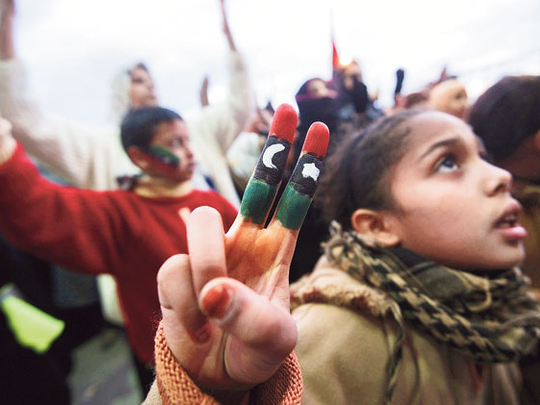
Benghazi: Khalifa is an ugly little man with a pot-belly and a pug nose. He appears greasy, slick, slippery — just like his personality.
He's been hanging around a few hotels where foreign press have been staying, always in the background, always watching.
He skulks around the lobbies and coffee shops, always listening, always making mental notes.
Khalifa is always interested in where people are going, what stories are being covered, picking up low-grade intelligence.
He says he speaks English — he does badly — and French and Italian.
Now he may have a perfectly good reason to be skulking around the shadows, but it's unnerving. He's awkward not adept, slippery, not smooth.
I make a habit to speak louder when he's around, keeping him confused.
No discretion here
If this is the way Gaddafi is gathering intelligence, they might as well give him a newspaper, cut eyes in it, and sit him in the lobby.
But at least he's working. And that says something in this free Libya.
After 42 years of Muammar Gaddafi's leadership, few young Libyans have worked, have work, or have the prospects of work.
They are educated but without opportunity, without the means of providing for themselves, their families, or putting a roof over their heads.
I met Mohammad, a software programmer with a university degree, good English, and a desire to work in information technology. In the west, his skills would land him a well-paying job and a career. Here in Benghazi he makes ends meet by delivering bread rolls for a bakery and hires his car out by standing in the central market shouting, "Driver, driver, driver," in Arabic.
If he's lucky, he can make 150 dinars (Dh550.86) in a week. At least since the revolution began and the foreign press arrived, he's been able to cash-in on the demand for translators, drivers and fixers.
His three brothers are all educated as well. One has a degree in economics, one in biology and a third in law. His parents ought to be proud — I'm sure they are — but all four of their university-educated sons in Gaddafi's Libya have no real jobs.
Their family, Mohammad tells me, are not well-connected. They are from the wrong tribe, have the wrong ties, are outsiders in their own country.
In the new free Libya — free of Gaddafi — Mohammad wants a job and so too do his brothers. In the new free Libya, those sentiments roll off the tongue as easy as concepts of democracy, free speech, equality for all, justice and respect for human rights.
Mouse hunt
I lost my mouse! It's one of those with a micro receiver in the USB port. I hate those little touchpads on laptops so I went looking for a mouse yesterday.
I can tell you that in all of Benghazi I found just one — and it was a model with round pins that I haven't used in a decade. If this is the state of the computer hardware used in this country, then Mohammad and his fellow IT graduates are unemployable in today's world — Gaddafi or no Gaddafi.
In Egypt and Tunisia and throughout the Arab world where young people have begun to protest and call for change, many academic papers will be written on the effect of Twitter or Facebook in the revolutions.
But in Libya this is not a Facebook revolution. It is a mobile phone revolution. That is how word of protests and revolt grew.
At a clothes shop in a souk — I came here for a few days nearly two weeks ago and my clothes are about to be deemed biological weapons — the young man there was fascinated by my old BlackBerry. He had never seen one, wanted to know about the web the phone's features, BB messenging. For him, my old BlackBerry was his first glimpse of a world he'd only seen in movies.
My little Samsung netbook, which my wife picked up cheap in Carrefour during last year's Dubai Shopping Festival, was a marvel to him. Don't forget, I could not show him the web because of a lack of net access — but he was blown away by its size, it's screen — all the things that you and I take for granted living in a country that has been without sanctions, and where technology marches forward daily.
Here, in this free Libya, technology is frozen a decade ago.
Khalifa is the information technology used by Gaddafi.












